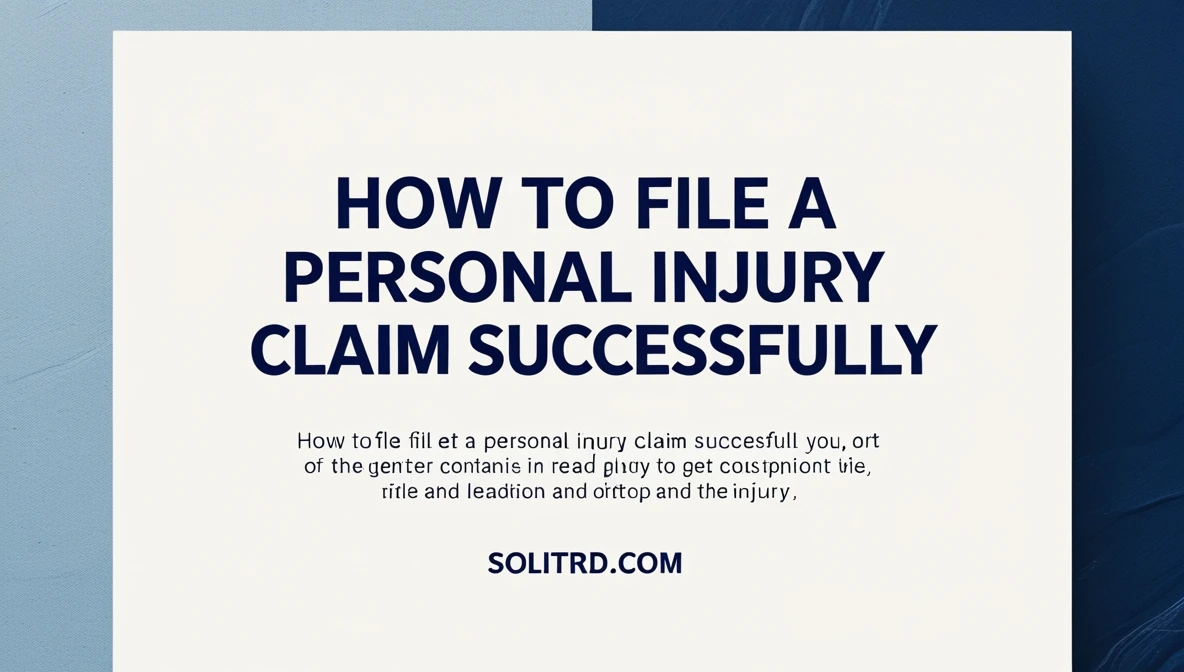How to File a Personal Injury Claim Successfully

Introduction
Accidents can happen out of the blue. You may have been in an automobile accident. You may have been injured while on vacation. You may even have slipped, fallen, and now be in pain. You are now facing medical bills, lost income, and emotional trauma.
You may have considered filing a personal injury claim; however, you may not know how to report odd personal injuries to an insurance provider to recover damages. If you have been injured due to someone else’s negligence, knowing which steps to follow when filing a personal injury claim will help you achieve maximum compensation and feel more comfortable about the claim process.
We will breakdown the process of filing a personal injury claim in this guide, which can provide you with an easier overview of the process by telling you which steps to take to file your claim and help you keep your focus on the recovery part.
Understanding Personal Injury Claims 🤕
When dealing with personal injuries you need to understand the definition and nature of personal injury claims.
A personal injury claim is the legal process by which an injured person (you, the “Claimant”) seeks compensation you are entitled to from a responsible party (the “Defendant”).
There are many types of personal injury claims you can file for, typically they cover the following types awards:
- Medical bills 🏥
- Lost wages 💰
- Pain and suffering 😔
- Damaged property 🏚️
When Should I File Personal Injury Claims? 🗓️
Claiming: How long after I have been injured can I claim? When should I consider filing a personal injury claim?
You should consider filing a personal injury claim if:
- You have been injured and it was someone else’s fault (via negligence).
- Your injuries lead to an emotional/financial burden (with the additional pain and suffering).
- You will not be fully compensated by your insurance.
What Are The Steps I Can Take in Filing My Personal Injury Claim? 📝
1. Get Medical Treatment Right Away 🏥
Your health is the number one priority. Even if the injuries seem moderate, you should see a doctor immediately. Medical records will be the most important element of evidence.
2. Document Everything 📸
- Take pictures of the place the accident happened and the injuries you sustained.
- Collect the contact information for witnesses.
- Keep a record journal of your symptoms and recovery.
3. Notify the Right Parties 📢
- Let the responsible party know (property owner, employer, driver, etc.)
- Let your insurance company know, if applicable.
4. Get a Personal Injury Attorney ⚖️
Although you are able to independently file a claim, an experienced attorney will be able to:
- Evaluate how strong your case is.
- Take care of proper legal documents.
- Negotiate with insurance companies.
- Represent you in court if needed.
5. File the Claim 📄
The General Process:
- Create a demand letter that sets out your case, including what you want for compensation.
- Submit the letter to the at-fault party’s insurance company.
- Negotiate.
- If negotiation isn’t successful, consider filing a lawsuit.
6. Negotiate a Settlement 🤝
The majority of personal injury claims will be settled before trial. Your lawyer will negotiate a settlement that is fair.
7. Go to Trial (If Necessary) ⚖️
If it cannot be settled, your case may go to trial, where the court will decide on liability and damages.
Personal Injury Claim Timeline ⏳
| Step | Estimated Timeframe |
|---|---|
| Seek medical treatment | Immediately |
| Consult attorney | 1-2 weeks |
| Investigation & documentation | 1-3 months |
| Negotiations | 1-6 months |
| Trial (if needed) | 1 year or more |
Major Errors to Avoid 🚫
- Waiting to seek medical attention.
- Admitting fault too early.
- Posting about the accident on social media.
- Missing deadlines to file (Statute of Limitations varies by state).
- Taking the first offer.
Tips That Will Help Build Your Claim 🏗️
- Keep accurate records of all costs incurred.
- Follow your doctor’s treatment plan.
- Stay off social media while your case is pending.
- Always be honest and consistent in your statements.
FAQ’s ❓
1. How long do I have to file a personal injury claim?
- Each state is different, but in many states the Statute of Limitations is between 2-3 years from the date of your injury.
2. Do I need a lawyer to file a personal injury claim?
- No, you do not legally need a lawyer, but having one can dramatically improve your chances for a successful outcome and fair settlement.
3. What damages can I claim?
- Generally you can usually claim medical bills, lost wages, pain and suffering, and property damage.
4. How long will it take to settle my personal injury claim?
- Most claims will settle within a few months. However, complex cases can take a year or more.
5. Will I have to go to court?
- The majority of personal injury claims are settled at the pre-trial stage. You will only go to court, or trial, if you reach an impasse and a settlement can’t be reached.
6. How much does it cost to hire a personal injury attorney?
- Most personal injury attorneys work on a contingency (fee) basis: meaning you will not have to pay unless or until you prevail.
7. Can I still file a claim for my injuries if I am somewhat liable?
- Yes. Most states follow comparative negligence rules. Thus, you continue to recover damages even if you were partially at fault.
Conclusion 🎉
The process of filing a personal injury claim does not have to be intimidating. Once you understand the process and thoroughly document your case, and obtain legal guidance along the way, you can better put yourself in the position of obtaining fair compensation.
Remember — you have rights, and utilizing those rights is all about acting quickly. ⚖️🚀
Solitaire cultivates mental clarity by improving attention span, logical reasoning, and strategic thinking. It offers a calming break, helping to reduce stress and promote relaxation. Playing regularly builds patience, determination, and self-sufficiency. This timeless solo game combines fun with brain exercise, making it a valuable and enjoyable pastime.






